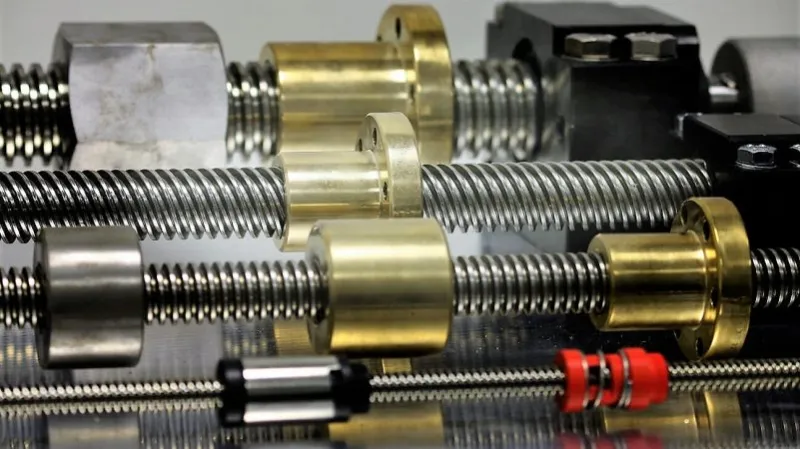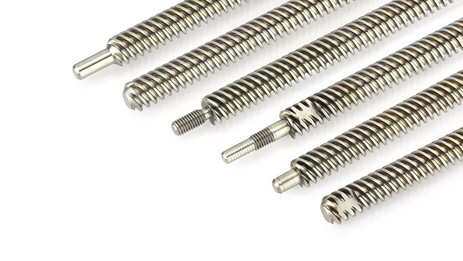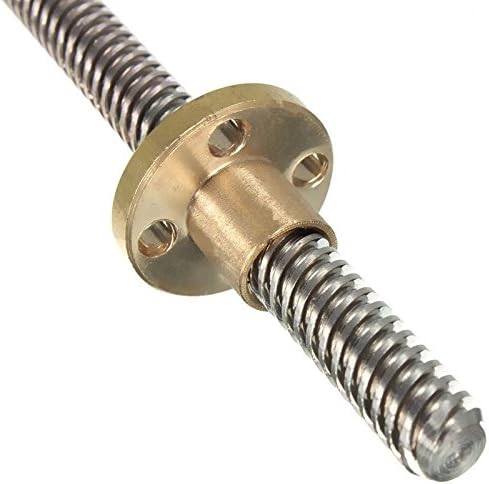Product Description
Domestic C7 rolled ball screw shaft, C5 ground ball screw shaft, Ball screw nut
Company Profile
HangZhou Wangong Precision Machinery Co., Ltd.
About US: Professional producing Ball screw, Linear guide, linear shaft, Linear roller guide and linear motion bearings
HangZhou Wangong Precision Machinery Co., Ltd was founded in 2008 and is located in HangZhou City, ZHangZhoug Pro. China. We ahve built a R&D and profuction base of more than 52000m2 , Our expertise lies in manufacturing precision transmission components, As a distinguished high-tech enterprise, we seamlessly integrate research and development, production, sales, and service. We have successfully incorporated advanced equipment and cutting-edge technologies from renowned countries like Germany, Japan and ZheJiang .
Product Description
1,Intruduction
High precision low noise CHINAMFG ball screw
Ball screw is made of screw, nut and ball. The function is to turn the rotary motion into liner motion, which is a further extension and development of ball screw. The significance of this development is to move into a rolling bearing from sliding action; With little friction, ball screws are widely used in various industrial equipment and precision instruments.
2, Ball screw feature
High Reliability
TBI MOTION or CHINAMFG ball screw has very stringent quality control standards covering every production process. With proper lubrication and use,trouble-free operation for an extended period of time is possible.
Smooth Operation
The high efficiency of ball screws is vastly superior to conventional screws. The torque required is less than 30%. Linear motion can be easily changed from rotary motion.
High Rigidity and Preload
When axial play is minimized in conventional screw-nut assemblies, the actuating torque becomes excessive and the operation is not smooth. The axial play in TBI MOTION or CHINAMFG precision ball screws may be reduced to zero by preloading and a light smooth operation is still possible. herefore, both low torque and high rigidity can be obtained simultaneously.TBI MOTION or CHINAMFG ball screws have gothic CHINAMFG groove profiles which allow these conditions to be achieved.
Circulation Method
Ball return tube method.(V,E,S,Y type);Ball defelector method.(I,U,M,K type)
High Durability
Rigidly selected materials, intensive heat treating and processing techniques, backed by years of experience,have resulted in the most durable ball screws manufactured.
3, All kinds of ball srew series
There are many different series of ball screw shaft with nut, like SFU series, SFS series, SFI series, SFY series, DFU series, SFUL series, SFK series.Each series has its own characteristics, Let’s look at the difference in appearance and characteristics.
| SFU series | SFS/SFA series | SFI series |
| DFU series | SFY series | SFK series |
| SCI series | Ball screw set | C5 ground ball screw series |
4, Ball screw Specification
1. Cold rolled ball screw;
2. Gcr15 material;
3. High-speed operation
4. C5 C7 C10 precision;
5. No gap and preloading
6. Quality as good as TBI brand is high precision, long life use.
7. Pay more attention to before-sale, in-sale, after -sales service.
8. Manufacturer with large stock & short delivery
| Ball Screw Features |
|||||
| Item | Material | Heat Treatment |
Hardness | Accurancy | Preload |
| Ball screw shaft | SCM450 S55C CF53 |
Induction Heating |
HRC58-62 | C5:0.018mm C7:0.05mm C10:0.21mm |
P1:Zero P2:Light P3:Medium P4:Heavy |
| Ball screw nut | SCM415 20CrMo |
Carbonizing Hardening |
HRC58-62 | C5:0.018mm | P1:Zero P2:Light P3:Medium P4:Heavy |
| Steel balls | SUJ2 GCr15 |
HRC58-62 | |||
| Brand name | ERSK, (they are able to interchange into ZheJiang TBI ball screw and nut) |
| Product name | C5 ground ball screw, C7 rolled ball screw |
| Model no. | SFU/SFNU/SFS/SFA/SFI/SFY/DFU/SFK/SCI series |
| Material | S55C material for ball screw shaft, 20CrMo material for ball screw nut |
| Service | after-sale service and technical assistance as per customer’s requirement and needs. Customers are always given quickly support. |
| Length | Max:6000mm, other length as your requirement |
| Delivery time | Base on customer required quantity,by negotiated |
| Products packing | Plastic bag+box case or wooden case, or according to customer’s requestment |
| Sample | Sample order could be available |
| Payment terms | T/t or L/C are available for large orders, Paypal and West Union for small orders |
| Shipping method | DHL,UPS,TNT,FEDEX,EMS,Airfreight and by sea, By negotiated |
| Quality | ISO9001-2008 |
5, We can machinize the ball screw shaft according to the drawings
6, Data sheet
Installation Instructions
The way to assemble the ball screw nut in the ball screw shaft
Related products
ERSK manufacturer main products
Our Advantages
As a distinguished high-tech enterprise, we seamlessly integrate research and development, production, sales, and service. We have successfully incorporated advanced equipment and cutting-edge technologies from renowned countries like Germany, Japan, and ZheJiang . Our commitment to innovation has led to the acquisition of multiple product design patents, and we proudly adhere to ISO9001 certification standards.
Our service
Our Team:
Professional technicians, high-quality production workers, 24-hour salespersons
OUR PHILOSOPHY:
Integrity is at the core of our values, and providing excellent
service is our top priority. We begin by understanding your
needs and strive to ensure your utmost satisfaction, forging a mutually beneficial relationship.
OUR MISSION:
Through technology and innovation, we strive to enhance
product quality and deliver exceptional products and services
to you.
OUR VISION:
We are firmly dedicated to CHINAMFG the pinnacle of highquality standards and venturing into the realm of world-class
advanced manufacturing industries.
We are excited about the opportunity to work with you and
exceed your expectations.
/* January 22, 2571 19:08:37 */!function(){function s(e,r){var a,o={};try{e&&e.split(“,”).forEach(function(e,t){e&&(a=e.match(/(.*?):(.*)$/))&&1
| Precision: | C7 |
|---|---|
| Screw Diameter: | >61mm |
| Flange: | With Flange |
| Samples: |
US$ 80/Piece
1 Piece(Min.Order) | Order Sample ball screw assemble
|
|---|
| Customization: |
Available
|
|
|---|
.shipping-cost-tm .tm-status-off{background: none;padding:0;color: #1470cc}
|
Shipping Cost:
Estimated freight per unit. |
about shipping cost and estimated delivery time. |
|---|
| Payment Method: |
|
|---|---|
|
Initial Payment Full Payment |
| Currency: | US$ |
|---|
| Return&refunds: | You can apply for a refund up to 30 days after receipt of the products. |
|---|

What factors should be considered when selecting lead screws for different mechanical applications?
When selecting lead screws for different mechanical applications, several factors need to be considered to ensure the optimal performance and suitability of the lead screw. Here are some key factors to consider:
- Load Requirements: Determine the maximum axial load and torque that the lead screw will need to support. Consider both static and dynamic loads, as well as any potential overload conditions. Ensure that the selected lead screw has the load-carrying capacity to handle the required loads without excessive deflection or failure.
- Precision and Accuracy: Evaluate the required positioning accuracy and repeatability for the application. Consider the lead screw’s thread pitch, lead error, and backlash characteristics. In applications that demand high precision, such as CNC machines or optical systems, choose lead screws with low backlash and high accuracy to minimize positioning errors.
- Speed and Efficiency: Determine the desired linear speed or travel rate for the application. Consider the lead screw’s thread design, lubrication requirements, and mechanical efficiency to ensure that the lead screw can operate at the required speed with minimal friction and energy loss.
- Environmental Conditions: Assess the operating environment for the lead screw. Consider factors such as temperature variations, humidity, dust, chemicals, and exposure to corrosive agents. Select lead screws with appropriate materials, coatings, and sealing mechanisms to withstand the environmental conditions and ensure long-term reliability.
- Space Constraints: Evaluate the available space for installing the lead screw. Consider the length and diameter of the lead screw, as well as any required support or mounting mechanisms. In tight spaces, stub Acme screws or compact designs may be more suitable.
- Speed and Duty Cycle: Determine the duty cycle of the application, including the frequency and duration of operation at different speeds. Consider the lead screw’s thermal characteristics, lubrication requirements, and the potential for heat generation at high speeds or prolonged operation. Choose lead screws that can handle the anticipated duty cycle without overheating or premature wear.
- Backlash Tolerance: Consider the permissible amount of backlash or play in the system. Backlash refers to the axial movement between the screw and nut when changing direction. Applications that require precise positioning or minimal lost motion, such as machine tools, may require lead screws with low backlash or anti-backlash mechanisms.
- Budget and Cost: Evaluate the budgetary constraints for the application. Consider the cost-effectiveness and value provided by different lead screw options. Compare factors such as initial cost, maintenance requirements, and expected lifespan to select a lead screw that offers the best balance of performance and cost.
By considering these factors, engineers and designers can make informed decisions when selecting lead screws for different mechanical applications. It is crucial to carefully assess the specific requirements of the application and consult with manufacturers or suppliers to ensure the chosen lead screw meets the application’s needs in terms of load capacity, precision, environmental compatibility, and overall performance.

How does the choice of lead screws affect the overall performance and reliability of linear motion systems?
The choice of lead screws has a significant impact on the overall performance and reliability of linear motion systems. Different types of lead screws offer distinct characteristics and capabilities that influence factors such as accuracy, load capacity, speed, efficiency, backlash, and durability. Here are some key ways in which the choice of lead screws affects the performance and reliability of linear motion systems:
- Accuracy and Precision: The selection of an appropriate lead screw type can directly impact the accuracy and precision of linear motion systems. Lead screws with fine thread pitches or multiple starts provide higher resolution and finer positioning capabilities, resulting in improved accuracy. Choosing a lead screw with low backlash and minimal axial play helps maintain precise motion control and repeatability.
- Load Capacity: Different lead screw designs have varying load-carrying capacities. Factors such as the diameter, pitch, material, and thread type influence the ability of a lead screw to handle axial loads. Selecting a lead screw with sufficient load capacity ensures the system can handle the required loads without compromising performance or risking premature failure.
- Speed and Efficiency: Lead screw selection affects the speed and efficiency of linear motion systems. Coarser thread pitches enable faster linear speeds, making them suitable for applications that require rapid movement. However, finer thread pitches offer increased mechanical advantage and torque conversion efficiency, making them preferable for systems requiring higher force output.
- Backlash and Repeatability: Backlash, the clearance between the lead screw and nut, can impact the accuracy and repeatability of linear motion systems. The choice of lead screw influences the amount of backlash present. Lead screws with low backlash or anti-backlash mechanisms minimize positioning errors and ensure consistent repeatability, enhancing system performance and reliability.
- Lubrication and Maintenance: Different lead screw materials and designs require specific lubrication and maintenance practices to ensure optimal performance and longevity. Some lead screws may require periodic lubrication, while others may be self-lubricating or require minimal maintenance. Choosing a lead screw that aligns with the maintenance capabilities and requirements of the system simplifies upkeep and reduces the risk of premature wear or failure.
- Environmental Considerations: The choice of lead screws should also take into account the environmental conditions in which the linear motion system will operate. Factors such as temperature, humidity, exposure to contaminants, or corrosive agents can impact the performance and reliability of lead screws. Selecting lead screws with appropriate materials, surface treatments, or protective coatings ensures compatibility with the intended operating environment.
It is crucial to carefully assess the specific requirements of the linear motion system and consider factors such as load capacity, accuracy, speed, backlash, maintenance, and environmental conditions when choosing a lead screw. Consulting with manufacturers, engineers, or industry experts can provide valuable insights and guidance to select the most suitable lead screw for achieving optimal performance, reliability, and longevity in a given application.

What is a lead screw, and how is it used in mechanical applications?
A lead screw is a type of threaded shaft used in mechanical applications to convert rotary motion into linear motion or vice versa. It consists of a screw with a helical thread and a matching nut with corresponding threads. The lead screw and nut are designed in such a way that when the screw is rotated, it moves the nut along its length, resulting in linear motion.
The primary purpose of a lead screw is to transmit motion and force between rotating and linearly translating components in a mechanical system. It offers precise control over linear movement and is commonly used in various applications, including but not limited to:
- Precision Positioning: Lead screws are widely used in applications that require precise positioning, such as CNC machines, 3D printers, and robotic systems. By coupling the lead screw to a motor or handwheel, the rotational motion can be translated into precise linear movement, allowing for accurate positioning of components or tools.
- Actuation and Adjustment: Lead screws are often utilized for actuation and adjustment mechanisms in equipment and machinery. They can be employed to raise or lower platforms, adjust the height of work surfaces, control the position of tool heads, or move components along a linear path. Lead screws provide a straightforward and reliable means of achieving controlled linear motion in these applications.
- Load Transfer: Lead screws can also serve as load-bearing elements in mechanical systems. They can transmit axial loads and handle tension or compression forces, making them suitable for applications that require smooth and controlled lifting or lowering of heavy loads. In such cases, the lead screw is often combined with thrust bearings or other supporting elements to handle the applied loads.
- Manual and Handwheel Operations: Lead screws are commonly used in manual and handwheel-operated systems. By incorporating a handle or handwheel, the user can rotate the lead screw directly, enabling manual adjustment or movement of components. This is frequently seen in applications like manual stage positioning, height adjustment mechanisms, or manual clamping systems.
- Power Transmission: In some cases, lead screws can be employed for power transmission purposes. While they are not as efficient as other transmission methods like gears or belts, lead screws can be used to transfer torque between rotating shafts and linearly translating components. This is often seen in applications where the primary focus is on converting rotational motion into linear motion rather than optimizing power transmission efficiency.
Lead screws come in various designs, including single-start and multi-start threads, different thread pitches, and varying lead screw and nut materials. The selection of a lead screw depends on the specific requirements of the application, such as load capacity, desired speed, precision, and environmental conditions. Factors like backlash, efficiency, and maintenance requirements should also be considered when choosing a lead screw for a particular mechanical application.


editor by CX 2024-03-29